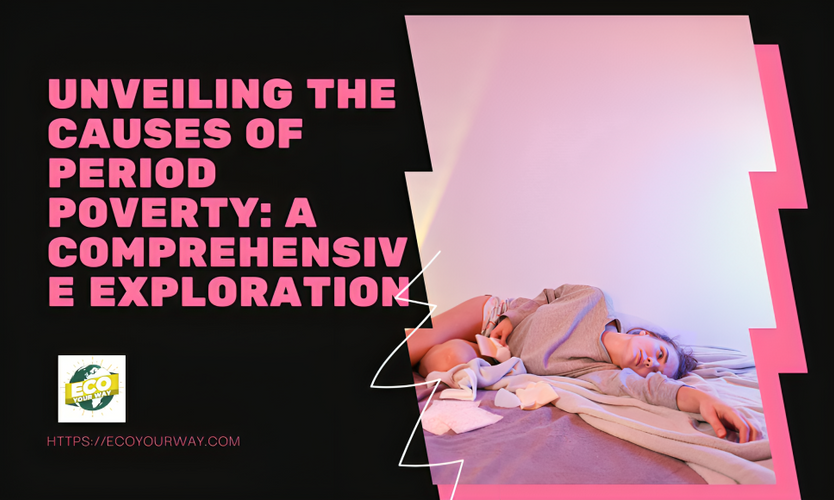Unveiling the Causes of Period Poverty: A Comprehensive Exploration
Dec 22nd 2023
causes of period poverty, causes of period, period poverty, period poverty causes, eco your way, ecoyourway, ecoyourway.com,
In the realm of societal issues, period poverty stands as a critical challenge that demands our immediate attention. At Eco Your Way, we recognize the urgency of addressing this pervasive problem and shedding light on its underlying causes. Join us on a journey through the intricacies of period poverty and gain insights that go beyond the surface.
Understanding Causes of Period Poverty
Defining the Phenomenon
Period poverty isn't merely a lack of access to menstrual products; it encompasses a broader spectrum of challenges that disproportionately affect individuals worldwide. From limited education on menstrual health to inadequate facilities, the issue extends far beyond the absence of sanitary products.
Economic Disparities and Menstrual Equity

One of the primary causes contributing to period poverty is the stark economic divide prevalent in our society. Individuals facing financial constraints often find themselves unable to afford basic menstrual necessities, perpetuating a cycle of inequality. At Eco Your Way, we believe in dismantling these barriers and promoting menstrual equity for all.
Societal Stigmas and Educational Gaps
Breaking the Silence
The silence surrounding menstruation perpetuates societal stigmas, hindering open conversations about menstrual health. Our mission is to break this silence and foster an environment where individuals can discuss menstruation without shame or judgment.
Bridging Educational Gaps
Education plays a pivotal role in combating period poverty. Lack of awareness about menstrual health exacerbates the problem, leaving many unaware of the resources available to them. At Eco Your Way, we are committed to bridging these educational gaps and empowering individuals with the knowledge they need.
Policy Advocacy for Change
Navigating Legislative Landscapes
Advocacy for policy change is essential to eradicating period poverty. Governments and institutions must take concrete steps to address this issue comprehensively. At Eco Your Way, we actively engage in advocating for policy reforms that prioritize menstrual health and well-being.
Sustainable Solutions for a Lasting Impact
Eco-Friendly Menstrual Products
Environmental sustainability is a crucial aspect of our approach to combating period poverty. We endorse the use of eco-friendly menstrual products that not only address the immediate need but also contribute to a healthier planet.
Community-Based Initiatives
Real change begins at the grassroots level. Eco Your Way supports and initiates community-based programs that provide access to menstrual products, education, and support networks. By fostering a sense of community, we aim to create lasting solutions that resonate on a local level.
Empowering the Future
Investing in Menstrual Health
As advocates for change, Eco Your Way is committed to investing in menstrual health initiatives. By supporting research, education, and access to resources, we strive to create a future where poverty is but a distant memory.
Causes of Period Poverty: Conclusion

In conclusion, period poverty is a multifaceted issue with deep-rooted causes that demand our attention and action. At Eco Your Way, we believe in going beyond the surface to tackle the problem comprehensively. Together, let's pave the way for a world where menstrual health is a universal right, not a privilege.
Causes of Period Poverty Pros:
1. Increased Awareness:
- Pro: The discussion about period poverty brings heightened awareness to the issue, fostering a more informed society.
- Pro: Increased awareness often leads to greater support for initiatives aimed at addressing the root causes.
2. Policy Advocacy:
- Pro: The recognition of period poverty as a significant problem prompts advocacy for policy changes.
- Pro: Governments and institutions may take affirmative action, implementing policies that address menstrual health and equity.
3. Community Engagement:
- Pro: The focus on period poverty encourages community engagement and grassroots initiatives.
- Pro: Local communities may rally together to support those affected, creating a network of assistance.
4. Innovation in Solutions:
- Pro: Awareness of period poverty sparks innovation in creating sustainable and affordable menstrual products.
- Pro: There is an opportunity for the development of eco-friendly alternatives, contributing to environmental sustainability.
5. Empowerment Initiatives:
- Pro: The acknowledgment of period poverty allows for the implementation of empowerment initiatives.
- Pro: Educational programs and support networks may emerge to empower individuals with knowledge and resources.
Causes of Period Poverty Cons:
1. Stigma and Taboos:
- Con: Discussions around period poverty may reinforce existing societal stigmas and taboos related to menstruation.
- Con: Individuals may be hesitant to seek help due to fear of judgment or discrimination.
2. Slow Policy Implementation:
- Con: While awareness may lead to policy advocacy, the actual implementation of policies addressing period poverty can be slow.
- Con: Bureaucratic hurdles and resistance may impede the timely execution of necessary changes.
3. Economic Challenges:
- Con: Economic disparities, a major cause of period poverty, are deeply entrenched and challenging to address comprehensively.
- Con: Economic solutions may require systemic changes that take time to manifest.
4. Limited Resources:

- Con: Despite increased awareness, resources to combat period poverty may still be limited.
- Con: Not all regions or communities may benefit equally from available resources, perpetuating disparities.
5. Cultural Resistance:
- Con: Cultural norms and resistance to change may hinder progress in combating period poverty.
- Con: Education and awareness initiatives may face challenges in societies where discussing menstruation is considered taboo.
1. What exactly is period poverty?
- Answer: Period poverty refers to the lack of access to menstrual hygiene products, education, and adequate facilities, often resulting from economic challenges, social stigma, and systemic issues.
2. What are the primary factors contributing to period poverty?
- Answer: Economic disparities, limited access to education on menstrual health, societal stigmas, and inadequate policies are the primary factors contributing to period poverty.
3. How does economic inequality exacerbate period poverty?
- Answer: Economic inequality prevents individuals from affording essential menstrual products and accessing proper healthcare, perpetuating the cycle of period poverty.
4. Are there specific demographic groups more affected by period poverty?
- Answer: Yes, individuals facing financial constraints, including low-income households, marginalized communities, and those without access to education, are disproportionately affected.
5. How does period poverty impact education?
- Answer: Period poverty can lead to missed school days due to the unavailability of menstrual products, contributing to educational gaps and hindering academic progress, especially among young girls.
6. What role do societal stigmas play in perpetuating period poverty?
- Answer: Societal stigmas surrounding menstruation can lead to shame and silence, hindering open discussions and preventing individuals from seeking help or support.
7. How can policy changes address period poverty?
- Answer: Advocating for and implementing policies that prioritize menstrual health, provide free or subsidized products, and promote menstrual equity are crucial steps in addressing period poverty.
8. What are some sustainable solutions to combat period poverty?
- Answer: Sustainable solutions include the promotion of eco-friendly menstrual products, community-based initiatives, and comprehensive education on menstrual health.
9. How can communities contribute to tackling period poverty?
- Answer: Communities can contribute by fostering open conversations, supporting local initiatives, and creating networks that provide access to menstrual products and education.
10. What is the long-term vision for addressing period poverty?
- Answer: The long-term vision is to create a society where menstrual health is a universal right, achieved through economic empowerment, education, policy changes, and community-driven initiatives.


